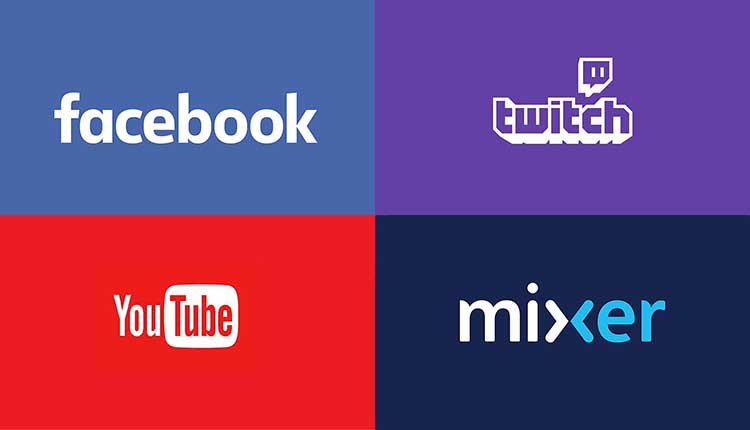
According to livestream production tools provider StreamElements, the market share for ubiquitous streaming platform Twitch has shrunk slightly over the last year, even if it retains its dominant position over other services in terms of hours watched; it brought in 73% of all streaming viewership throughout 2019, which is a 2% drop from last year. Meanwhile, Mixer and Facebook Gaming saw substantial growth: the two saw a 149% and 210% year-over-year growth in hours watched this year, respectively.
The news comes via StreamElements’ State of the Stream report, produced in collaboration with influencer analytics platform Arsenal.gg, which looks back on the year’s biggest trends in one of the gaming industry’s fastest-growing forms of entertainment. GameDaily talked to Doron Nir, CEO of StreamElements, to get the lowdown on what happened in streaming in 2019.
“Mixer and Facebook Gaming took different approaches,” Nir said of their growth during the last 12 months. “Mixer was successful at building a lot of small communities with a good word-of-mouth, while reducing a lot of friction around the process of going live. Their success, more than anything else, comes from their connection with Microsoft and Xbox.”
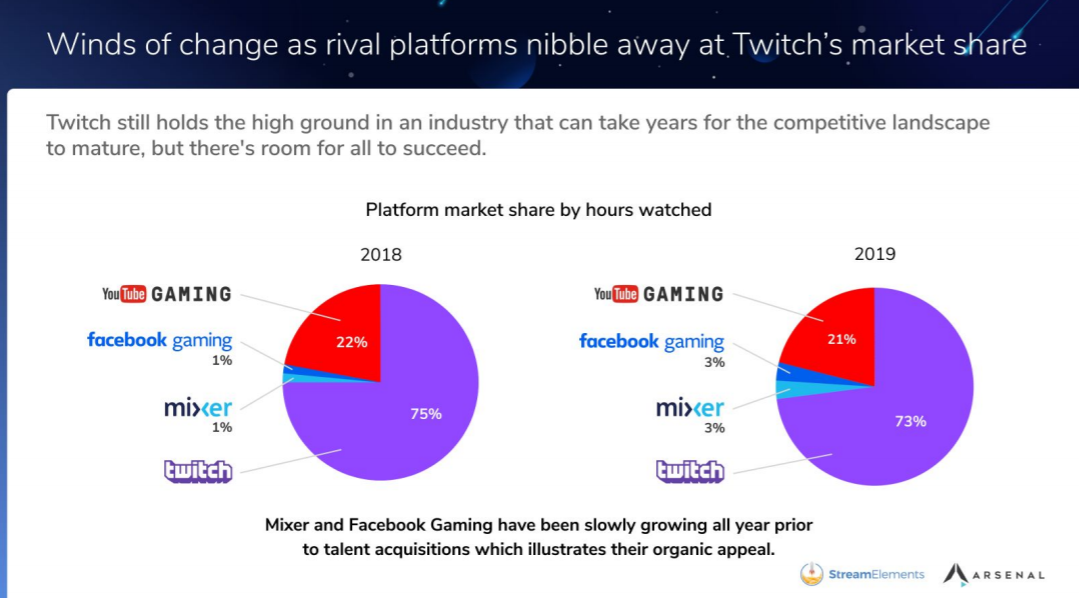
Mixer made some serious talent acquisitions this year, including nabbing Ninja and Shroud away from Twitch. Nir said that these deals are simply the cherry on top of a year where Mixer built some great communities in North America, which accounts for 40% of its viewership.
On the other hand, Facebook Gaming saw growth in its Asain and Latin American audiences thanks to exclusivity deals with NexxuzHD and Lolitao FDEZ, two of the most popular Spanish-speaking streamers. The platform also boasts more mobile-focused content.
Despite these two disparate audiences, there is a lot of common ground shared by Mixer and Facebook Gaming. “Among the things [they] have in common is that these platforms invested more heavily in growth, unlike YouTube and Twitch who have been doing it for years now,” Nir said. “In addition, both have been working hard to ensure their core performance meets or exceeds what the larger platforms are offering. This has made them more appealing for streamers, especially those who are worried about the challenges of being discovered and heard on those bigger platforms.”
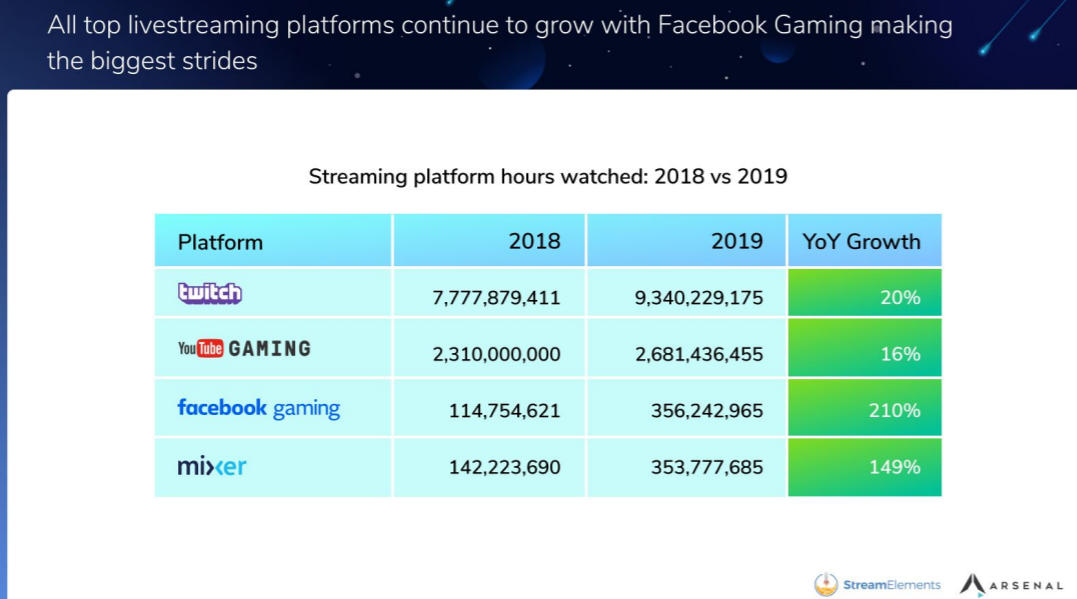
Looking at the most popular games streamed during the year, League of Legends was the most-viewed title on Twitch, a position it had to regain after Fortnite unseated it last year. Many of the other games in the top-10 shouldn’t be surprising: Grand Theft Auto V, Dota 2, Counter-Strike, World of Warcraft, Apex Legends, Overwatch, and Hearthstone all appear on the list.
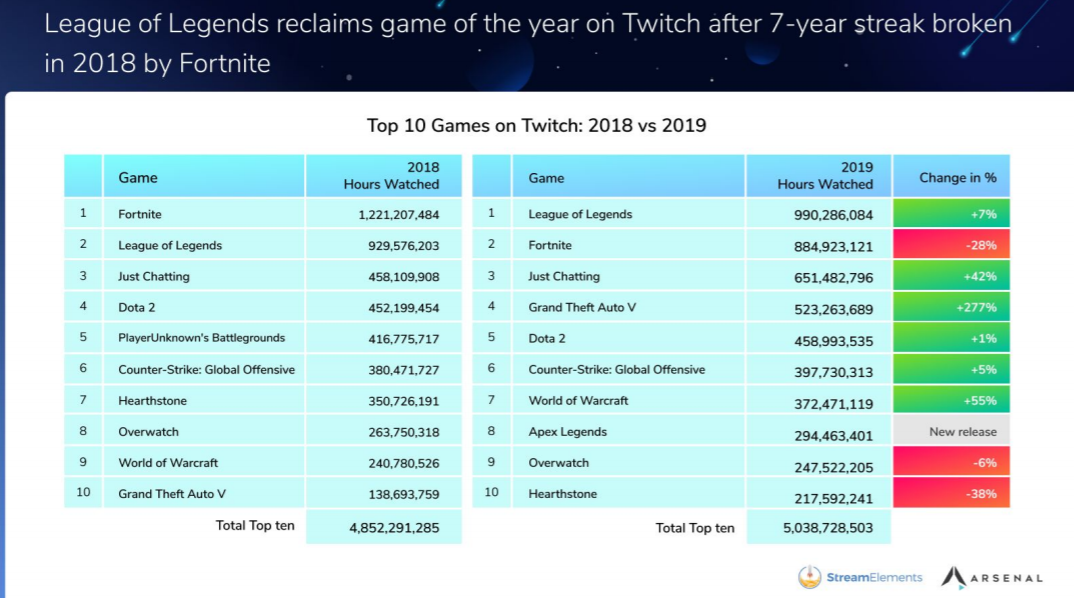
Nir said that there are some significant qualities shared between the games that appeal to viewers. “Some of the main components of a good game for streamers are beautiful graphics, gameplay that’s packed with reaction-eliciting moments, open-ended experiences with great replay value, such as multiplayer games, and games that lend themselves to role-playing.”
Beyond the games, Nir said that it’s also critical to have features which allow viewers to engage with the creator and help shape the experience: “Over the next year we are going to see more and more of that.”
For Apex Legends, its successful stealth launch in February was propelled by the influence of some of the most popular livestreamers, which reinforces just how important personalities have become to the gaming ecosystem.
“Apex Legend’s launch illustrated the power of leveraging content creators to build brand awareness and helped propel it to being one of the top 10 games of the year,” Nir explained. “Even though viewership dropped significantly when many of the top steamers who put it on the map moved onto other games, the powerful debut ensured that it is frequently now one of the top 10 games on Twitch.”
One notable inclusion on the top ten games of the year is the “Just Chatting” channel on Twitch–it claimed the number three spot on StreamElements’ most-watched list. The channel is a place where content creators are able to simply talk with their audience without playing a specific game. It’s a fascinating practice, and a reflection of the evolving tastes of consumers.
“First and foremost, it is all about the human connection,” Nir said of the appeal of Just Chatting. “Twitch is a very community-driven platform, and the Just Chatting category provides creators with a way to connect more directly with their fans than when they are playing games. There are also a lot of streamers who aren’t big on gaming, but recognize that Twitch has created a really good platform for live vloggers, such as extensive moderation tools and a large global audience.”
As we near the arrival of the next generation of game consoles, it’s worth wondering about how streaming might be impacted. Since most streaming is done via PC, Nir anticipates minimal change to the current status quo.
“Games move consoles, so as long as the hardware companies double down on exclusive quality titles, streamers will want to play them,” Nir said. “However, they will still be streamed from a PC. Streaming on consoles roughly makes up a quarter of Twitch’s broadcaster base and is predominantly used by casual gamers.”
If the next generation of consoles can manage to make their broadcast experiences incorporate more of the features leveraged by the PC platform, Nir said, they could greatly expand their user base. Things like adding OBS functionality and methods for monetization may give consoles the potential to disrupt the streaming ecosystem.
“We have yet to see the hardware companies tease how they plan to evolve their live streaming features to make a prediction on if it’s a game changer that mirrors what we know is possible,” Nir noted.
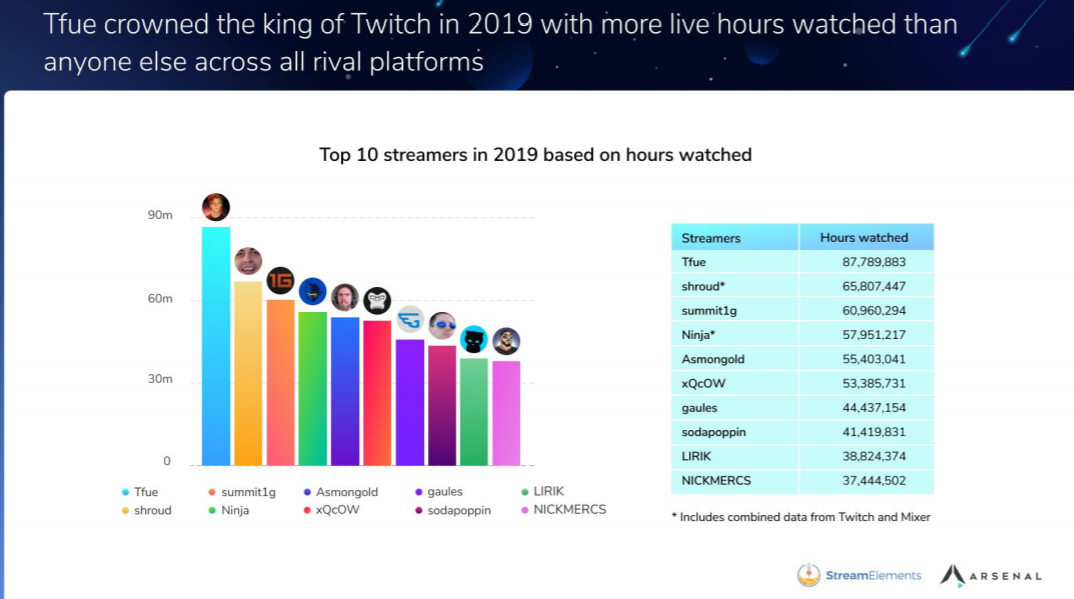
All told, 2019 will go down as the year where Twitch saw smaller platforms cut into its seemingly untouchable lead in the streaming market. Still, every one of the major platforms saw growth, so it’s not like there isn’t room for everyone to thrive. As long as new games and personalities continue to rise, so will the popularity of watching them.
Sam, the Editor-in-Chief of GameDaily.biz, is a former freelance game reporter. He's been seen at IGN, PCGamesN, PCGamer, Unwinnable, and many more. When not writing about games, he is most likely taking care of his two dogs or pretending to know a lot about artisan coffee. Get in touch with Sam by emailing him at sdesatoff@rektglobal.com or follow him on Twitter.
 GameDaily.biz © 2024 | All Rights Reserved.
GameDaily.biz © 2024 | All Rights Reserved.